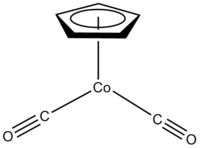
Photo from wikipedia
Development of new chemotherapeutic agents to treat microbial infections and recurrent cancers is of pivotal importance. Metal based drugs particularly ruthenium complexes have the uniqueness and desired properties that make… Click to show full abstract
Development of new chemotherapeutic agents to treat microbial infections and recurrent cancers is of pivotal importance. Metal based drugs particularly ruthenium complexes have the uniqueness and desired properties that make them suitable candidates for the search of potential chemotherapeutic agents. In this study, two mixed ligand Ru(III) complexes [Ru(Cl)2(SB)(Phen] (RC-1) and [Ru(Cl)2(SB)(Bipy)] (RC-2) were synthesised and characterized by elemental analysis, IR, UV-Vis, 1H, 13C NMR spectroscopic techniques and their molecular structure was confirmed by X-ray crystallography. Antibacterial activity evaluation against two Gram-positive (S. pneumonia and E. faecalis) and four Gram-negative strains (P. aurogenosa, K. pneumoniae, S. enterica, and E. coli) revealed their moderate antibacterial activity with MIC value of ≥250 μg/mL. Anticancer activity evaluation against a non-small lung cancer cell line (H1299) revealed the tremendous anticancer activity of these complexes which was further validated by DNA binding and docking results. DNA binding profile of the complexes studied by UV-Visible and fluorescence spectroscopy showed an intercalative binding mode with CT-DNA and an intrinsic binding constant in the range of 3.481-1.015× 105 M-1. Both the complexes were also found to exert weak toxicity to human erythrocytes by haemolytic assay compared to cisplatin. Potential of these complexes as anticancer agents will be further delineated by in vivo studies.
Journal Title: Bioorganic chemistry
Year Published: 2019
Link to full text (if available)
Share on Social Media: Sign Up to like & get
recommendations!